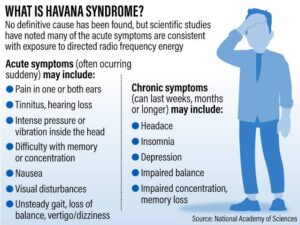Unraveling the enigma of the Havana Syndrome in Russia: Explore the origins, manifestations, and political implications of this mysterious phenomenon, and discover the challenges and scientific investigations shaping our understanding. Learn about protective measures and the path forward in addressing this pressing global security issue.
Introduction:
In recent years, a mysterious phenomenon known as the Havana Syndrome has captured global attention, causing a wave of concern among diplomats and intelligence agencies. Initially reported among U.S. diplomats stationed in Cuba in 2016, the syndrome has since manifested in various locations worldwide, including Russia. This blog aims to delve into the intricacies of the Havana Syndrome as it pertains to Russia, exploring its origins, manifestations, and the ongoing efforts to decipher its enigmatic nature.

Origins of the Havana Syndrome:
The term “Havana Syndrome” originated from a series of health incidents reported by U.S. diplomats and intelligence officers stationed in Havana, Cuba, in late 2016. Victims experienced a range of symptoms, including vertigo, nausea, headaches, and cognitive difficulties, often following exposure to specific locations or noises. Despite extensive investigations, the exact cause of these symptoms remained elusive, fueling speculation and conspiracy theories.
Manifestations in Russia:
The Havana Syndrome soon transcended its origins in Cuba, with similar incidents reported in other countries, including Russia. Diplomats and intelligence personnel stationed in Moscow and other Russian cities began reporting symptoms consistent with the syndrome, raising concerns about the scope and implications of this mysterious phenomenon. The incidents in Russia added a new dimension to the global discourse surrounding the Havana Syndrome, prompting heightened scrutiny and diplomatic tensions.
Challenges in Identifying the Cause:
One of the most significant challenges in understanding the Havana Syndrome is the difficulty in identifying its cause. Initial hypotheses ranged from sonic attacks to psychological warfare, but none provided a definitive explanation. In Russia, where suspicions of state involvement run high, attributing the syndrome to specific actors becomes even more complex. The opaque nature of intelligence operations and the lack of transparency from relevant authorities further complicate efforts to unravel the mystery.
Political Implications:
The emergence of the Havana Syndrome in Russia has significant political implications, exacerbating existing tensions between Moscow and Western nations. Accusations of targeted attacks and espionage have strained diplomatic relations and fueled mutual distrust. Moreover, the lack of accountability and cooperation from Russian authorities has hindered efforts to address the issue diplomatically, perpetuating a climate of suspicion and uncertainty.
Scientific Investigations:
Amidst the political turmoil surrounding the Havana Syndrome, scientific investigations have sought to shed light on its underlying mechanisms. Researchers have explored various theories, including microwave radiation, chemical exposures, and psychological factors, but definitive conclusions remain elusive. In Russia, scientific inquiry into the syndrome faces additional challenges, including limited access to data and resources, as well as potential interference from government authorities.
Protective Measures and Countermeasures:
In response to the growing threat posed by the Havana Syndrome, governments and intelligence agencies have implemented various protective measures and countermeasures. These include enhancing security protocols, deploying specialized equipment to detect potential threats, and providing medical support to affected personnel. In Russia, efforts to mitigate the risk of exposure to the syndrome are likely intertwined with broader security strategies aimed at safeguarding national interests and projecting power on the global stage.
The Path Forward:
As the Havana Syndrome continues to perplex researchers and policymakers alike, the path forward remains uncertain. Addressing the syndrome effectively requires a multifaceted approach encompassing scientific research, diplomatic engagement, and international cooperation. In the case of Russia, fostering transparency and accountability will be essential to building trust and facilitating meaningful dialogue on this pressing issue. Ultimately, only through concerted efforts and collaboration can the mysteries of the Havana Syndrome be unraveled and its impact mitigated.
Conclusion:
The Havana Syndrome represents a complex and enigmatic phenomenon with far-reaching implications for global security and diplomacy. In Russia, the emergence of the syndrome has added a new layer of intrigue to an already contentious relationship with Western powers. As efforts to understand and address the syndrome continue, it is imperative that governments, researchers, and international organizations work together to unravel its mysteries and mitigate its impact on the world stage. Only through collective action can we hope to confront this challenge and safeguard the well-being of diplomats and intelligence personnel worldwide.
Disclaimer: The information presented in this blog is for informational purposes only and should not be construed as medical, legal, or professional advice. While efforts have been made to provide accurate and up-to-date information, the complexities of the Havana Syndrome and its manifestations in Russia may not be fully captured. Readers are encouraged to consult relevant authorities, experts, and sources for comprehensive guidance on this subject matter. The author and publisher disclaim any liability for any loss or damage arising from the use of the information presented in this blog.




